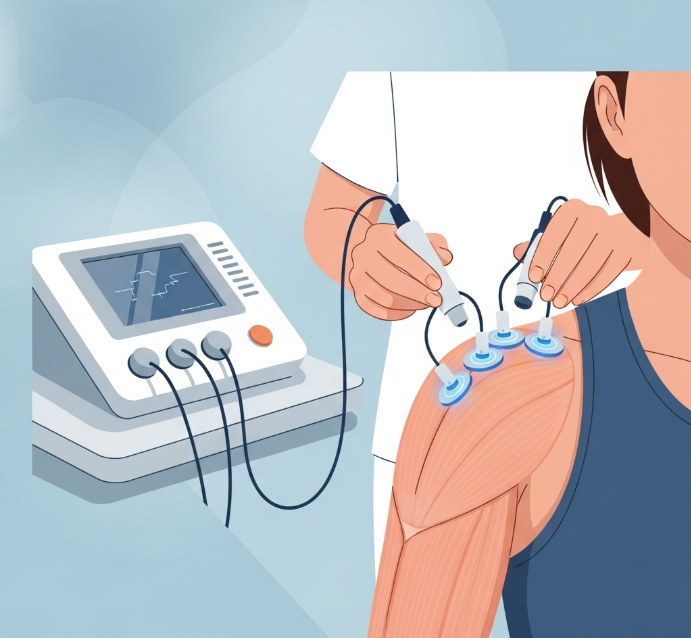Struggling to lift your arm can be incredibly frustrating, impacting your daily activities and overall quality of life.
Simple tasks like combing your hair, reaching for items on a high shelf, or even playing sports become difficult.
The emotional toll can be significant, leading to frustration, dependence on others, and reduced self-esteem.
Deltoid weakness, a common issue, can stem from various causes, making everyday movements challenging.
But there's hope! This blog post explores how Interferential Therapy (IFT), a powerful tool in physiotherapy, can
help you overcome deltoid weakness and regain full arm function.
Why Deltoid Weakness Matters
The deltoid muscle, a key player in shoulder function, is essential for lifting and rotating your arm. When this
muscle weakens, simple tasks like reaching, carrying objects, or even getting dressed become difficult. Deltoid
weakness can arise from several factors, including conditions like a Hill-Sachs lesion, rotator cuff tendinopathy,
nerve damage, or prolonged disuse following an injury. For example, a Hill-Sachs lesion affects shoulder joint
stability and subsequently impacts deltoid function. Untreated deltoid weakness can lead to frozen shoulder or
compensatory movements that lead to other injuries. Identifying the root cause is crucial for effective treatment.
Deltoid weakness not only limits arm movement but can also lead to chronic shoulder pain and discomfort.
Addressing this weakness promptly is essential to prevent further complications and unlock your shoulder's full
potential.
Understanding Interferential Therapy (IFT)
Interferential Therapy (IFT) is a non-invasive electrotherapy technique used in physiotherapy to manage pain
and promote healing. IFT involves crossing medium-frequency currents to create a therapeutic low-frequency
stimulation in tissues. This lower frequency current is believed to stimulate nerve fibers, reduce pain, and promote
muscle contractions. IFT is said to alleviate pain and enhance circulation.
This deeper penetration allows it to target the deltoid muscle effectively, making it a suitable treatment for deltoid
weakness and associated pain. IFT can also help reduce edema, which can contribute to pain and limited movement.
IFT for Deltoid Muscle Rehabilitation
When applied to the deltoid muscle, IFT can be a game-changer. The stimulated muscle contractions can help
strengthen the weakened muscle fibers, gradually improving your ability to lift and move your arm. IFT can help
you regain strength and reduce pain by interfering with their transmission to the brain, providing much-needed
relief from shoulder pain. IFT can be part of deltoid muscle rehabilitation.
Furthermore, IFT can improve blood circulation to the deltoid muscle, promoting healing and reducing inflam-
mation. This enhanced circulation can also help improve the muscle's overall function and range of motion. By
addressing both pain and muscle weakness, IFT plays a crucial role in restoring shoulder function and improving
your quality of life.
What to Expect During an IFT Session
During IFT session, your physiotherapist will carefully tailor the electrode placement and current intensity to
your specific needs and pain points. A physiotherapist will carefully place electrodes on the skin surrounding the
deltoid muscle. The placement will depend on the specific area of weakness and pain. The IFT machine will then
be adjusted to deliver the appropriate current frequency and intensity. The physiotherapist will closely monitor
your response to the treatment and make adjustments as needed.
You may experience a tingling or buzzing sensation during the session, but it should not be painful. The treatment
typically lasts for 10 minutes for pain relieving. The goal is to stimulate the deltoid muscle without causing discomfort.
It's important to communicate any sensations or concerns you have to your physiotherapist during the session.
Combining IFT with Other Physiotherapy Techniques
While IFT is a valuable tool, it's often most effective when combined with other physiotherapy techniques.
Physiotherapy exercises for deltoid weakness, such as isometric exercises and range-of-motion exercises, are
crucial for rebuilding strength and improving function. Manual therapy techniques, such as massage and joint
mobilization, can also help reduce pain and improve shoulder mobility. Patient education regarding the injury, its
causes, and symptoms is also a vital component. Teaching patients about injury prevention and proper warm-up
and cool-down routines can help prevent future issues.
Conclusion
Deltoid weakness can significantly impact your ability to perform everyday tasks and enjoy an active lifestyle.
Interferential Therapy offers a promising avenue for restoring deltoid strength and function, reducing pain,
and improving your overall quality of life. Remember, IFT is often most effective when combined with other
physiotherapy techniques, such as exercise and manual therapy. Don't let deltoid weakness hold you back any
longer. Contact a qualified physiotherapist today to discuss your treatment options and start your journey towards
a stronger, healthier shoulder. Empowering patients, enhancing outcomes – that's our commitment to you.
Schedule your IFT consultation today!
